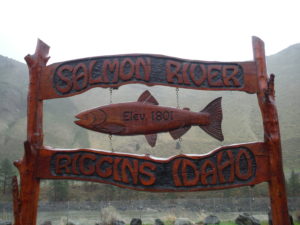A letter to Idaho Senator James Risch from Riggins, ID
Posted /Uncategorized
Today we hand delivered a letter from Riggins, Idaho small businesses to Idaho Senator Risch’s staff in Boise. The letter stressed the economic importance of angling expenditures to small Idaho river communities and the need to recover the endangered salmon and steelhead. A PDF version is available here. Click on the image of the letter to read both pages.
April 12th, 2017
Senator James Risch
350 N. 9th St., Ste 302
Boise, ID 83702
Dear Senator Risch,
The town of Riggins, like many small towns along the Snake and Salmon Rivers, relies on tourism for its livelihood. We live and die by the river conditions. An evaluation of the 2001 fishing season found that we conservatively benefited from $10 million in angler spending that year, which is 25% to 33% of our economy. This is likely the difference between a sustainable small town or a dying ghost town. People spent money on guide services, lodging, food, gas, fishing supplies, and related activities. Angling supports the economy when other sources of income, like rafting, are unavailable. Ample water, salmon, and steelhead are the keys to our survival.
Since the 1970’s, salmon and steelhead runs have dwindled, the chief cause being the construction of the four lower Snake River dams. The dams drove wild Snake River steelhead, sockeye, and spring, summer, and fall Chinook, onto the Endangered Species List. The four dams and reservoirs alone claim on average 30% of the juvenile fish before they even reach the Columbia River, where they are further decimated by another 4 dams on their journey to the Pacific Ocean. Predictions for 2017 steelhead returns are the worst in almost 20 years. Chinook returns are expected to be down too. Our future, which is directly tied to the fish, is at stake. Fisheries around the Pacific Northwest are threatened, and we don’t have a guaranteed fishing season. Recall the 1980 “fish wars” right here in Riggins due to the closed fishing season. A repeat would be devastating to small businesses up and down the Snake and Salmon Rivers. Having Endangered Species Act protections on the fish also negatively affect the local farmers and ranchers. But we understand those protections are entirely necessary to preserve the species. If the fish were allowed to recover, ESA restrictions would be removed, benefitting our local farmers and ranchers.
Nearly a billion dollars have been spent in futile attempts to recover Idaho’s endangered salmon and steelhead. The bill for these efforts is passed on to us—your constituents—in our monthly electricity rates. The Army Corps was right in its 2002 EIS when it stated that breaching has the highest probability of meeting salmon and steelhead survival and recovery criteria and that their preferred alternative (fish passage modifications) would likely be slightly worse than doing nothing. It’s time to try something new. It is essential to the survival of Idaho’s wild salmon and steelhead that their diverse genetics be preserved by increasing their rate of survival in the hydropower system. Increased hatchery fish production and good ocean conditions have masked the failures of current attempts to improve fish passage. The State of Idaho has worked hard in recent years to improve spawning habitat in the upper reaches of the Salmon River and its tributaries, but the wild fish aren’t returning in substantive numbers because of the dams.
We, the small businesses of Riggins ask you to support breaching the four lower Snake River dams and to discuss dam breaching with the Army Corps of Engineers Civil Works in Washington DC using the 2002 EIS to save precious time and money. This will provide immediate benefit to the Idaho river communities and promote the entrepreneurial spirit and skills of our local businesses. One estimate projects that Riggins alone would receive an additional $26 million in economic benefit from a fully recovered salmon and steelhead fishery, and that Idaho as a whole would benefit by $544 million per year. This is far more benefit than the four lower Snake River dams currently provide to our state.
Breaching the dams would provide us with a reliable fishing season and it would launch the salmon and steelhead in a giant leap towards full recovery. Riggins can’t afford to wait for the completion of the current NEPA process, which may not result in any action for 10 years. By then the wild Snake River salmon likely would not have the capacity to recover. Dam breaching can propel salmon recovery forward to provide Riggins the economic benefit needed to keep us going
Respectfully,
Gary Lane
Wapiti River Guides

